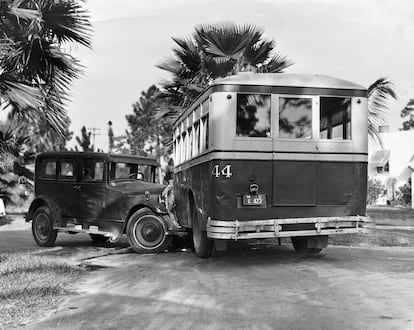Impulsiveness, distractions, substance abuse: The human factor in fatal traffic accidents
The biggest challenge on the road is to avoid being distracted by the phone, but there are other circumstances that increase the risk of a crash

The summer months, especially weekends and nighttime, carry a higher risk of serious accidents on the road, particularly among young people, and particularly among young males. Many of these deaths are avoidable if distractions are dealt with, traffic rules are respected and safety measures applied. And it should be kept in mind that when an accident involves a family member or friend, it ceases to be just another statistic, and assumes a human face that leaves a trail of suffering and pain in its wake.
Certain personalities and driving styles lead to more serious accidents. Among young people, risk-taking can hold a certain appeal, particularly when there’s a need to impress others with speed and cutting through traffic. Impulsivity, thrill-seeking, showing off and overestimating one’s abilities behind the wheel lead not only to speeding but miscalculated overtaking, encroachment on the oncoming lane or disregard for right-of-way signs. Uncontrolled anger also has a significant influence on serious traffic accidents and is linked to aggressive driving behavior that includes excessive speed and risky maneuvers that reduce the driver’s cognitive and motor skills and increase the risk of collision.
External and internal distractions
A fatal accident can result from a variety of factors. Distractions figure prominently because driving is not a purely automatic task. It involves constant attention, which, in turn, depends on the number of stimuli to which a driver is exposed. Human beings do not have the capacity to perform different complex tasks with total efficiency. There are external agents that cause distractions, such as haste, complacency that comes with driving a regular route, an eye-catching landscape, adverse weather conditions or an interaction with the vehicle’s occupants, especially with children.
At other times, distraction comes from within – from worries, displeasure or emotional discomfort. Certain physiological factors, such as fatigue on a long journey or a lack of sleep, can slow down reactions and skew perceptions. But the big challenge nowadays is not to be distracted by technological devices, such as GPS navigators, cell phones or WhatsApp and social media, which are constantly demanding our attention. Using the cell phone can cause three types of distractions: visual through looking at the phone and not at the road; cognitive through having the mind focused on writing or reading a message; and manual, through typing on the screen. Taking your mind off the road is just as dangerous as looking away, and a lull in concentration of just a few seconds can prove lethal.
The role of alcohol, drugs and psychotropic drugs is fundamental in fatal traffic accidents. Alcohol initially produces a euphoric effect and a false sense of security, with an overestimation of one’s own capacity as well as that of the vehicle. But they also trigger a depression of the central nervous system, slowing our reactions, and causing visual disturbances regarding distances and drowsiness. This results in reduced risk perception and inappropriate driving decisions, such as speeding or bad timing when overtaking.
As for other psychoactive substances, such as cocaine or stimulants, they generate excitement, a feeling of omnipotence and loss of impulse control. Cannabis, in turn, has a perception-altering effect, with a distortion of spatial-temporal sensations and a negative impact on attention and capacity for self-control. Driving requires concentration, a keen perception of the environment and quick reactions. A dangerous characteristic of alcohol and drug use is a lack of self-awareness, which translates into the perception that “I am in control.”
Although their impact on accident rates is not as high as alcohol or other drugs, psychotropic drugs, such as benzodiazepines and antidepressants, can lead to accidents due to side effects, including drowsiness, blurred vision, mental confusion and lack of coordination. The negative influence of psychotropic drugs on driving depends on the dose used, the time of use and the specific response of each person. What exacerbates the effect of psychotropic drugs is the additional intake of alcohol, which increases the driver’s drowsiness and loss of reflexes. It should be stressed that alcohol is the substance most associated with traffic accidents.
Finally, there are some mental disorders, such as depression, that have a negative effect on driving as they can reduce concentration, increase anxiety and irritability, delay sensorimotor functioning, increase fatigue and impair decision-making. In certain cases, people with depression may drive recklessly. Traffic accidents that appear to be accidents may actually be deliberate suicide attempts. In these cases, by attributing their death to an accident, the deceased avoids giving family members the additional pain of knowing their death was suicide.
Sign up for our weekly newsletter to get more English-language news coverage from EL PAÍS USA Edition
Tu suscripción se está usando en otro dispositivo
¿Quieres añadir otro usuario a tu suscripción?
Si continúas leyendo en este dispositivo, no se podrá leer en el otro.
FlechaTu suscripción se está usando en otro dispositivo y solo puedes acceder a EL PAÍS desde un dispositivo a la vez.
Si quieres compartir tu cuenta, cambia tu suscripción a la modalidad Premium, así podrás añadir otro usuario. Cada uno accederá con su propia cuenta de email, lo que os permitirá personalizar vuestra experiencia en EL PAÍS.
¿Tienes una suscripción de empresa? Accede aquí para contratar más cuentas.
En el caso de no saber quién está usando tu cuenta, te recomendamos cambiar tu contraseña aquí.
Si decides continuar compartiendo tu cuenta, este mensaje se mostrará en tu dispositivo y en el de la otra persona que está usando tu cuenta de forma indefinida, afectando a tu experiencia de lectura. Puedes consultar aquí los términos y condiciones de la suscripción digital.









































